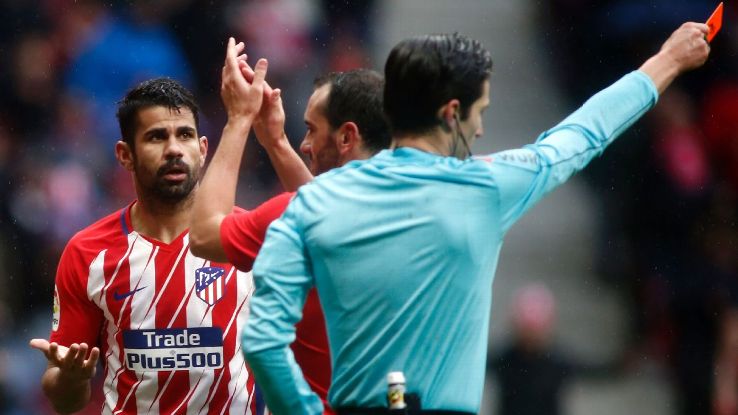- Molly O’Callaghan, a 19-year-old swimmer from Australia, etched her name in the annals of swimming history with a remarkable performance in the Women’s 200m Freestyle event
- Akshay Bhatia, 21, Wins his First PGA Tour Title at the Barracuda Championship
- Bruno Fernandes Replaces Harry Maguire as New Man Utd Captain
- Lionel Messi Surprises Teammate in group chat ahead of Grand Unveiling
- Man Utd Sign Keeper Andre Onana from Inter
Atletico Madrid and La Liga have missed the fiery, furious Diego Costa
- Updated: January 20, 2018
- 803
They tore the shirt from his back, a gaping hole exposing his torso, which was tighter now than ever before, but he kept on. Not without complaint, of course, but he did. Besides, it was better this way, his kind of thing: There’s not much he enjoys more than a bit of a rumble, and even the moaning comes with a glint in the eye. Life’s boring without a battle, so he battled and bumped and crashed into people, scowling on the outside and probably smiling on the inside.
He beat them too, mostly. Mostly, but not always: On Wednesday night, he scored again but in the end, Atletico Madrid were unexpectedly defeated 2-1 by Sevilla, meaning they must now go to the Sanchez Pizjuan and win if they’re to reach the semifinal of the Copa del Rey. It’s not easy, but who wants easy? Not Diego Costa, that’s for sure. There’s no fun without a fight.
Costa’s back, all right. And next week they will need him to be, more than anyone anticipated when he scored the opener on Wednesday night but no more than they always knew. Atletico Madrid had wanted to sign him back since the day they sold him; three years and a catalogue of strikers later, they did. They had to wait another four months for him to actually play, but when he returned, they saw that he hadn’t changed a bit. The only replacement for Diego Costa was, as Diego Simeone had long suspected, Diego Costa.
As for Costa, he had quickly suspected that there was no place like home and that was back in Madrid, even if the Vicente Calderon stood empty astride the motorway now, a new place built out by Barajas instead. Antonio Conte’s text, shared with the media, gave him a way back, which isn’t to say it was an easy way. He rebelled, sat on his sofa, refused to return. He spoke out, said he was treated like a criminal. He waited, dug his heels in and wouldn’t budge. Chelsea, he said, would have to sell him for cheap; after all, they had told him to go. It might have been what he wanted but they were the ones that did it, that said they didn’t want him. Well, Conte was and Costa had the proof, there on his phone.
Eventually, they sold. He wasn’t cheap: At €65 million, his price had trebled but no one at Atletico doubted he was worth it. Worth the wait, too.
Costa arrived in September. He hadn’t played since May, hadn’t done any preseason training and was overweight. ‘I’m not afraid of the scales,’ he said, smiling as he landed, walking out into the arrivals hall at Terminal 4, ‘but I am afraid of ‘Profe’ Ortega.’
For those who don’t know, Ortega is something of a legend, a man with a bit of a reputation as something like the biggest sadist in Spain. Aged 59 but putting many a younger man to shame, he is the club’s fitness coach and someone who never, ever lets up, a man who spent the morning of the Champions league final running laps around San Siro. Now he had Costa.
‘El Profe’ had time too. Atletico could not register Costa until the winter window. He had 100 days. He cycled, ran and lifted weights. He ate carefully with a diet followed strictly, five tightly controlled meals a day. At times it was cruel: There is a photo of him pedalling away on a static bike at the side of the club’s Cerro del Espino training ground, watching the others play. Torture and motivation in one. No pain, no gain and all that.
Photos were released periodically like a chronicle of his return, the work behind it revealed in snapshots. He’s coming, he’s coming. With each picture, he looked fitter, meaner and leaner, the fear of God put into opponents. Put them together and it was like a montage in a film; four months depicted with speed. All it lacked was some thumping track. Not Rocky running through the snow but Costa sweating on a futuristic bike, wires connected to his body, breathing apparatus, his skin tightening, muscle tone returning. By the time ‘El Profe’ had finished with him (except that he was never, ever finished with you), he had lost eight kilos (18 pounds).
Costa regularly boxed in a gym owned by Fernando Torres and it turned out he was pretty good at it, or so the coaches said. He seemed to quite like it, they said. No surprises there, you might say. Costa, fighting? Who’d have thunk it? It was so very Costa, the kind of training you could imagine him actually using. AS ran some photos from the gym. One sparring partner obligingly lay on the canvas, Costa grinning, his fists in the air, the champ. ‘Sugar Ray Costa,’ they called him on their cover.
By then, they could do the report; they knew it had worked and they were happy to reveal what he had been up to. Costa was playing; back at last. It had taken a while. Most thought it would take a bit longer. He’d been out for so long and had done nothing all summer, just eating and playing the occasional kick-about with his mates, that the doubts focused on how quickly he could return and really contribute. The response was unequivocal.
Two hundred and twenty-one days later, Costa ran onto the pitch at Lleida, a sub in the Copa del Rey. Five minutes later, he walked off again. He had scored and had his shin trodden on as he reached for the ball, diving in where the studs were. ‘He’d put his foot in the blades of a fan,’ grinned Vitolo afterward.
Costa’s last game for Atletico had been at the Stadium of Light; his last game for Chelsea had been at Wembley. He had not played a minute since, in eight months. And here he was, midweek away game against a Second Division B side. But he didn’t want to stop. Costa limped round the pitch and showed the mark to Simeone: just another war wound, not enough to sideline him, not after so long. He thought ‘sod this, then’ and walked back on again where he confronted opponents and transformed his team.
If that was Diego Distilled, what came next, against Getafe four days later, was even more so, like a trailer for a film. ‘Costa, The Return’ or ‘Revenge of the Killer Costa,’ perhaps. In which he plays the bad guy. A cartoon bad guy, almost a caricature, tough as old boots, scowling and striking matches on his stubble. The man you love to hate. And secretly love. The man you want on your side, that’s for sure. Himself, in other words.
At his presentation, Atletico’s president said he was a man who needed no presentation. Simeone called him the most important signing they had made in recent years. He would fit. As Carlos Matallanas wrote, ‘there are players, like Iniesta, who are a symphony. … Costa is pure rock and roll.’
And that it what Atletico, who blast out AC/DC’s ‘Thunderstruck’ just before kick off every game, wanted. On his first game at the Wanda, he was everything they wanted. He fought everyone, elbowed an opponent, got booked, scored a goal, ran into the crowd — to be fair, that little stairway up to the stand was perfectly placed and asking for it — and came back down to be shown a second yellow.
It was some first start back: a goal and a red card to follow a goal and an injury.
It didn’t help his team to go down to 10 men and yet they loved him even more for it; no one was really complaining even if the captain Gabi did say that he probably deserved a ‘clip round the ear’ for getting sent off. Instead, they welcomed this. ‘He brought enthusiasm,’ said Simeone.

The next game, he provided an assist. The game after that he was suspended. And the game after that, he scored the opener against Sevilla, and had the shirt torn from his torso. Costa can’t do it all himself,’ AS reported, almost as if they were surprised by that fact. Because even if he hadn’t changed the result, it feels like he has changed everything, except himself.
No one wanted that. There’s something almost refreshing about how openly he plays, even when he thinks he is being sneaky, and how there is no real mask for his malice, which then melts away with the final whistle. Atletico felt different now: exciting and scary. ‘He transmits fear,’ said Simeone — and that was exactly what he had been looking for.
But was it just them? Was it them and everyone else, too? Over the past few weeks it has felt almost as if the rest of Spain wanted him back as well. It has been interesting to watch this signing become so celebrated even in a country dominated by those other two clubs. They had all missed Costa even as they denounced him. Maybe so that they could denounce him? Some have tried but no one has played his role quite like he does. Even beyond something basic: the fact that he is very, very good.
On the Spanish Football Podcast, Phil Kitromilides is fond of quoting the bad-guy scene from ‘Scarface’ when it comes to Costa. In it, Al Pacino launches into a speech in a restaurant. ‘You’re all bunch of f—ing a–h—-,’ he says. ‘You know why? Because you don’t have the guts to be who you want to be. You need people like me. You need people like me so that you can point your f—ing fingers and say, ‘That’s the bad guy.’
‘So what does that make you? Good? You’re not good. You just know how to hide, how to lie. Me? I don’t have that problem. Me? I always tell the truth, even when I lie. So say good night to the bad guy. Go on. This is the last time you’re going to see a bad guy like this again, let me tell you.’
Four years ago when Atletico had lost the Champions League final in Lisbon and Chelsea met the €40m buyout clause in his contract, many thought that it might well be the last time they saw a bad guy like this. But Diego Costa is back.
Source: www.espnfc.com










